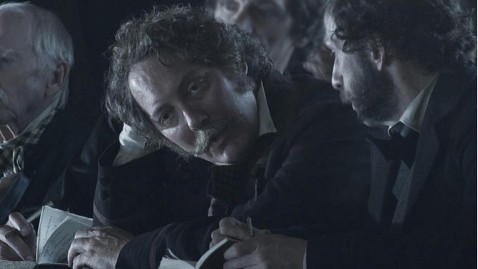James Spader Not Nostalgic About Lincoln-Era Politics

James Spader as W.N. Bilbo in "Lincoln." Credit: DreamWorks Pictures/Twentieth Century Fox.
After spending months in the nineteenth century reliving the push to get the 13th amendment passed, you'd think James Spader, who plays a lobbyist dispatched to get votes for the bill in " Lincoln," would be a little nostalgic about how politics worked in the good ol' days. The rhetoric! The Scotch! The wigs!
Turns out, he's pretty pleased with the way things work in Washington now. "There's something very endearing in the amateurishness of it, back then," he told ABCNews.com last week. "People look at lobbying and lobbyists and sort of vilify that practice, but listen, lobbying has been around since the first formation of Congress. It just hadn't been institutionalized at that point."
WATCH: James Spader Talks 'Lincoln' on 'GMA'
He agreed that "Lincoln," fronted by Daniel Day Lewis, depicts "one of the most defining moments in terms of the character of our country, to this day." But when it comes to politics then vs. politics now, there's a clear winner.
Take, for example, the scene in which Spader's character, W.N. Bilbo, hurls himself down the lawn between the Capitol and the White House to deliver an urgent message as the 13th amendment hangs in the balance. He arrives at Lincoln's desk huffing and puffing, on the verge of turning into a puddle. Spader much prefers the way communication works now. Exhibit A: the most recent presidential election.
"People who supported Obama felt like they formed a relationship, that they were being spoken to," he said. "The way that campaign worked and the way he's worked during his first term is to make people feel like he's grasping their hand, whether it's by tweeting or email, moments after an event, sometimes during an event. It makes people relate to him."
He alluded to Mitt Romney's "47-percent" comments, and the inability of Republicans to reach African-American and Hispanic voters.
"I think a large faction of our country felt that they absolutely were not being spoken to," he said. "And certain exposures were made that made it quite clear they were not only were they being not spoken to, they were being dismissed entirely."
Tweets and Facebook status updates are all well and good, but what about speech-giving in the era of Lincoln? Does Spader wish today's leaders were able to express themselves as eloquently as the often-poetic 16th president? Not quite - he noted that before radio and TV, "you read an interpretation of a speech in the paper." Now the stakes are higher.
"You see it all, every bit of it, and therefore a politician today is being faced, on a national stage, with speaking to their constituency while also speaking to a nation and fit within the context of the international stage," he said. "That's a very difficult thing to balance, and it's not easy for many to figure out. Those that do stick out."
Asked to name his favorite modern day political orator, Spader, an avowed Obama supporter, gave a timely, if predictable, answer.
"I think our president is wonderful at that," he said. "If not the whole, at least he speaks to the fabric of the country. And the fabric of the country is diverse. That is an achievement."